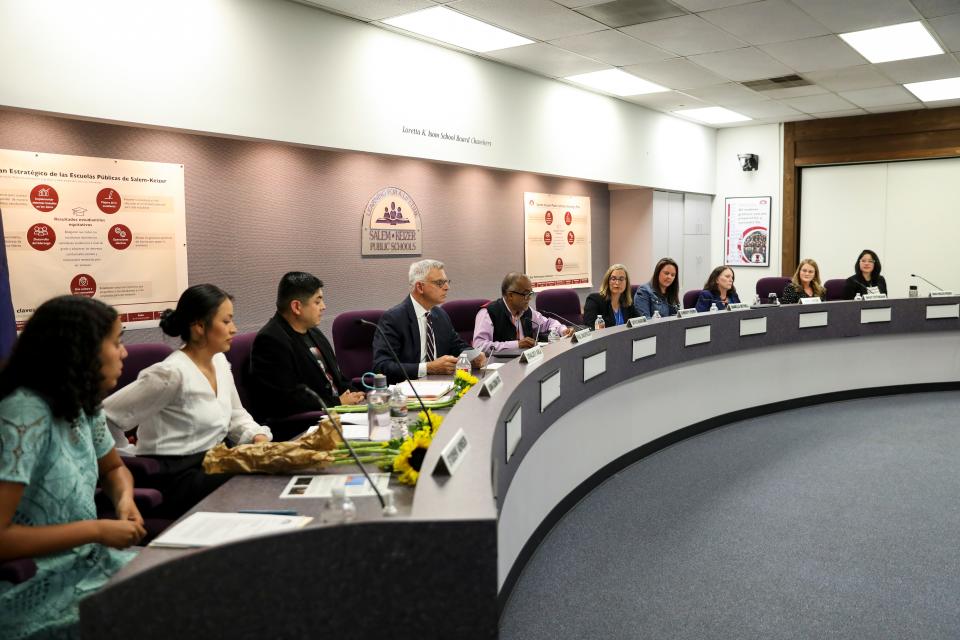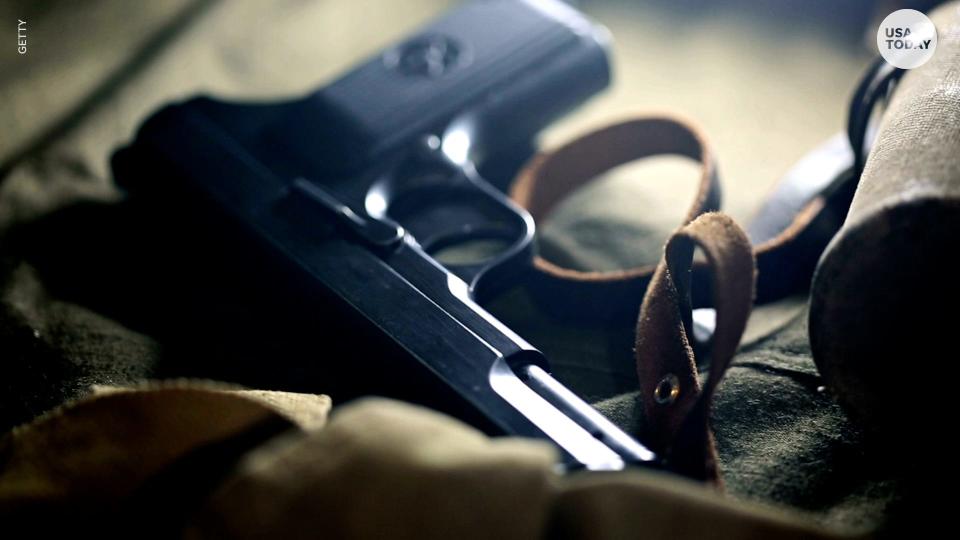Proposed Salem-Keizer School District concealed carry ban could impact campus visitors
The Salem-Keizer school board is expected to vote Aug. 9 on a resolution that would further prohibit weapons on district property. The proposed policy expands existing restrictions to include all concealed firearms carried by campus visitors.
The board first discussed the topic in a June 28 work session and again after the first reading of the proposal July 12.
Board members remain split on the issue.
Newly elected chairwoman Ashley Carson Cottingham, co-vice chairwomen María Hinojos Pressey and Karina Guzmán Ortiz, and member Osvaldo Avila support the resolution to further prohibit weapons. Members Danielle Bethell, Satya Chandragiri and Marty Heyen oppose it.
Backstory:Salem-Keizer board considers ban on concealed guns at schools
Both sides feel their stance is the safer option.
Several community members have testified at recent board meetings. Some argued the removal of concealed carry handguns will make schools safer with fewer weapons around children. Others said it will leave adults powerless.
With a 4-3 majority on the board in favor of the resolution, it's likely to pass.
The Statesman Journal spoke with Salem-Keizer Public Schools Superintendent Christy Perry about the proposed resolution. Here are more details on the proposal:
What is the current weapons policy in Salem-Keizer?
Salem-Keizer already has policies in place that limit weapons on district property. Perry confirmed staff and students are not allowed to have weapons of any kind, including licensed concealed carry guns.
Currently, in Salem-Keizer schools, visitors — which include parents, guardians, volunteers, guest speakers, organizations renting facilities and other community members — "cannot possess, transmit, sell, or in any way dispense a firearm (including look-alikes) or other implement which could be considered dangerous or used as a weapon."
This applies to district properties at all times, not just when school is in session.
Any person found in violation of this provision, according to the existing policy, "will be subject to referral to law enforcement authorities." Any person on campus or participating in district-sponsored functions, other than a police officer or person under the authority of a police officer, is subject to the same requirement.
Perry said Salem-Keizer's existing policy was not prompted by state law and is similar to districts' policies across Oregon that say "no weapons on campus."
"But there's always been this place in the law that concealed carries (are) still technically allowed from the public because of the way the concealed carry law works," she explained.
Now, that has changed.
What's changed in the state law?
In its 2021 legislative session, Oregon lawmakers passed Senate Bill 554, which expanded the list of public building locations where concealed handguns could be prohibited to include, among others, state universities, community colleges and K-12 schools.
Institutions that choose to be added to the protected group must formally notify the community through signage on all district buildings and messaging on their website.
"So, that's how the law changed," Perry said. "It allowed K-12 to make a determination about concealed carry that wasn't there before."
Concealed Weapons Resolution by Statesman Journal on Scribd
How have other districts responded?
The majority of Oregon's 197 school districts have not opted to expand restrictions. However, a couple dozen have, including Klamath Falls, Myrtle Point, Tillamook, Pendleton, Tigard-Tualatin, Lake Oswego and Woodburn.
What would the proposed Salem-Keizer resolution do?
Salem-Keizer's proposed resolution would "prohibit weapons, including concealed weapons, per ORS 166.377 and direct the superintendent to develop and enact administrative policy to achieve this outcome."
Because Salem-Keizer already has some restrictions in place, this resolution would expand restrictions to cover school visitors.
"The only change is the 'visitors in public with a concealed carry,' " Perry said. 'That's it, that's this resolution. That's the only thing that it adds."
How would the new policy be enforced?
While the school board sets policy, Perry and her staff are the ones responsible for implementing and reinforcing it.
Perry said enforcement of the new policy, if passed, would look similar to what the district already does when there are suspected weapons on campus.
If someone sees a weapon during the school day, officials lock down the school, Perry said, "because ... you don't expect a weapon to be on campus, right?"
School staff and officials would immediately investigate, just like they would if they were worried a student had a weapon.
"None of that changes," she said.
"But let's say we (get) a report that we have a church on the weekends or parent that's coming in and out of school that has a concealed carry," she said.
There would be signs posted saying that isn't allowed, and anyone with a district rental agreement must agree to have no weapons, including concealed carries, on campus at any time.
District officials will call to ensure they understand the policy.
"So, do we immediately go to, 'We have somebody with a weapon or a concealed carry on campus, we're calling the police?' No, no. We'd give them a call, check-in," she said. "Most of our families and parents and volunteers want to follow the rules, they want to have safe campuses."
Banning groups from future rentals or access to schools as a volunteer would only happen if the initial conversations did not de-escalate the situation. A referral to law enforcement would only happen in escalated situations.
How does this resolution relate to recent changes with SROs?
For more than two years, there have been tense community debates about Salem-Keizer school resource officers.
Though SRO contracts were ended last year, law enforcement still responds in emergencies and there are district-employed security specialists in the schools. Security specialists are not armed, and they do not handle discipline in terms of referrals to the police.
When asked how the weapons ban resolution relates to SROs, Perry said, "It doesn't."
More:Texas shooting puts focus on safety plan developed by Salem-Keizer schools
Salem-Keizer did not use concealed carry as a way to make schools safer when they contracted SROs, Perry said. And this resolution won't stop law enforcement in emergency situations.
"Law enforcement aren't concealed carry. They are trained professionals that have the ability to carry a weapon," she said. "So, if they needed to come on campus, this would never prohibit that. And I think that's an important distinction — that law enforcement is still allowed to carry if they come on campus."
Why is this conversation taking place now?
Salem-Keizer's board discussion in June came just weeks after the Uvalde, Texas, school shooting that left 19 elementary school children and two teachers dead, and days after the U.S. Supreme Court struck down a New York law requiring state residents to have "proper cause" to carry a handgun.
However, Perry said the main reason this is being discussed now is because it's summer. Large discussions like these are often conducted by the board while school is out and plans can be implemented in the new school year.
This conversation is not taking place due to a specific incident in Salem-Keizer, Perry said.

How do the different sides feel about the resolution?
Proponents of the resolution argue this is a preventative measure that would help ensure violent incidents don't take place in schools.
Firearm injury is one of the leading causes of injury and death in Oregon, according to the latest available data from the Oregon Health Authority.
In 2019, 566 people statewide died from a firearm injury, about 12.5 per 100,000 residents. Firearm deaths occur due to suicide, homicide, legal intervention and unintentional shootings. More than 80% of these deaths in Oregon are due to suicide, state data show.
Opponents of the Salem-Keizer resolution argue someone with a concealed handgun could stop a dangerous situation, like a mass shooting. Examples are given as proof of that, such as Elisjsha Dicken, the armed bystander who killed a shooter at an Indiana mall in July.
Salem-Keizer board member Bethell, who is a concealed carry licensee herself, said the ban is "extremely offensive for people who go through the processes" of becoming licensed handlers. Member Heyen argued the board was "poking the wrong bear," adding if the board is trying to do something to prevent shootings, "concealed weapon holders are not the problem."
However, there are concerns by other Salem-Keizer school board members that not all of these individuals are highly trained for crisis events like school shootings. That fear is further heightened with concern that a missed shot in a school could injure or kill a child.
Is Oregon unique when it comes to guns and schools?
Oregon is currently the only state in the Northwest that allows teachers or the general public to carry guns in K–12 schools.
According to data collected by "Everytown for Gun Safety" — a nonprofit founded in 2013 by former New York City Mayor Mike Bloomberg — Alaska, Idaho, Washington, California, Montana and Nevada are among 33 states that have instituted a “no guns in K-12 schools” policy.

That said, Perry clarified that teachers and staff in Salem-Keizer schools are already not allowed to have any guns, including concealed carry weapons. She said, "Educators being armed ... isn’t on the table."
When would the changes be implemented?
If the resolution passes, Perry said the district will then get the policy work in place.
"The tricky part is going to be how quickly can we get up signs," she said.
Perry didn't have a specific timeline but said even before the signs are fully installed, they will still get out information.
She said the policy will be implemented before the start of the new school year in early September.
"I think people should plan that if (the board passes) it, it starts immediately," Perry said, "and then we'll get the policy and the information out to families and visitors and volunteers."
Can the policy be changed in the future?
Yes. The school board makes decisions regarding district policy. If a future board decided it did not want this policy, Perry said, they could go through the process of changing it.
Can community members still share their thoughts on this topic?
Yes. The Salem-Keizer school board is expected to have a second reading of the resolution and vote on it during its Aug. 9 meeting, though the agenda has not yet been released.
Typically, there is a period of 30 minutes or more allotted for public comment for both agenda and non-agenda items. A lottery system is used to select speakers at random.
Go to salkeiz.k12.or.us/schoolboard to sign up for public comment, read the submission guidelines or contact the school board members directly.
Contact Statesman Journal education reporter Natalie Pate at npate@statesmanjournal.com or 503-399-6745. Follow her on Twitter @NataliePateGwin.
This article originally appeared on Salem Statesman Journal: Impact of Salem-Keizer schools' proposed concealed carry ban

